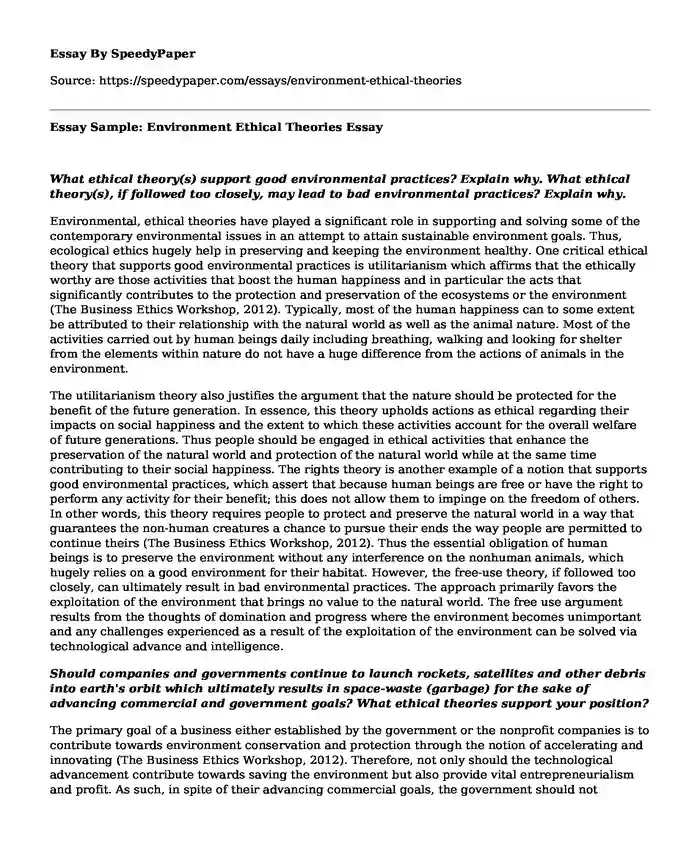
| Type of paper: | Critical thinking |
| Categories: | Anthropology Ecology Government Ethics |
| Pages: | 3 |
| Wordcount: | 651 words |
What ethical theory(s) support good environmental practices? Explain why. What ethical theory(s), if followed too closely, may lead to bad environmental practices? Explain why.
Environmental, ethical theories have played a significant role in supporting and solving some of the contemporary environmental issues in an attempt to attain sustainable environment goals. Thus, ecological ethics hugely help in preserving and keeping the environment healthy. One critical ethical theory that supports good environmental practices is utilitarianism which affirms that the ethically worthy are those activities that boost the human happiness and in particular the acts that significantly contributes to the protection and preservation of the ecosystems or the environment (The Business Ethics Workshop, 2012). Typically, most of the human happiness can to some extent be attributed to their relationship with the natural world as well as the animal nature. Most of the activities carried out by human beings daily including breathing, walking and looking for shelter from the elements within nature do not have a huge difference from the actions of animals in the environment.
The utilitarianism theory also justifies the argument that the nature should be protected for the benefit of the future generation. In essence, this theory upholds actions as ethical regarding their impacts on social happiness and the extent to which these activities account for the overall welfare of future generations. Thus people should be engaged in ethical activities that enhance the preservation of the natural world and protection of the natural world while at the same time contributing to their social happiness. The rights theory is another example of a notion that supports good environmental practices, which assert that because human beings are free or have the right to perform any activity for their benefit; this does not allow them to impinge on the freedom of others. In other words, this theory requires people to protect and preserve the natural world in a way that guarantees the non-human creatures a chance to pursue their ends the way people are permitted to continue theirs (The Business Ethics Workshop, 2012). Thus the essential obligation of human beings is to preserve the environment without any interference on the nonhuman animals, which hugely relies on a good environment for their habitat. However, the free-use theory, if followed too closely, can ultimately result in bad environmental practices. The approach primarily favors the exploitation of the environment that brings no value to the natural world. The free use argument results from the thoughts of domination and progress where the environment becomes unimportant and any challenges experienced as a result of the exploitation of the environment can be solved via technological advance and intelligence.
Should companies and governments continue to launch rockets, satellites and other debris into earth's orbit which ultimately results in space-waste (garbage) for the sake of advancing commercial and government goals? What ethical theories support your position?
The primary goal of a business either established by the government or the nonprofit companies is to contribute towards environment conservation and protection through the notion of accelerating and innovating (The Business Ethics Workshop, 2012). Therefore, not only should the technological advancement contribute towards saving the environment but also provide vital entrepreneurialism and profit. As such, in spite of their advancing commercial goals, the government should not continue launching satellites, rockets, and debris due to the adverse effects on the space or the environment. One theory that puts more emphasis on this is utilitarianism through the concept of a cost-benefit analysis that allows businesses to set aside costs of preventing pollution of the environment that would significantly contribute to a cleaner world (The Business Ethics Workshop, 2012). Utilitarianism theory also holds that the right act increases the overall happiness of the society, which is evaluated through the net profits that an organization gains after deducting all the costs of the action.
References
The Business Ethics Workshop (2012). Chapter 14: The Green Office: Economic and Environment. Washington, DC: The Saylor Foundation, 627-664
Cite this page
Essay Sample: Environment Ethical Theories. (2022, Dec 15). Retrieved from https://speedypaper.net/essays/environment-ethical-theories
Request Removal
If you are the original author of this essay and no longer wish to have it published on the SpeedyPaper website, please click below to request its removal:
- Essay Example: Exploring Political Discourse
- Ethics in Social Research, Essay Example
- The Hound Coursing a Stag - Painting Analysis Essay Sample
- Export Strategy Essay Sample from Our Database
- Andreas Ekstrom: The Moral Bias
- Law Essay Example: Ledbetter vs. Goodyear Tire and Rubber Company
- Essay Sample on Second Language Class Evaluation
Popular categories




